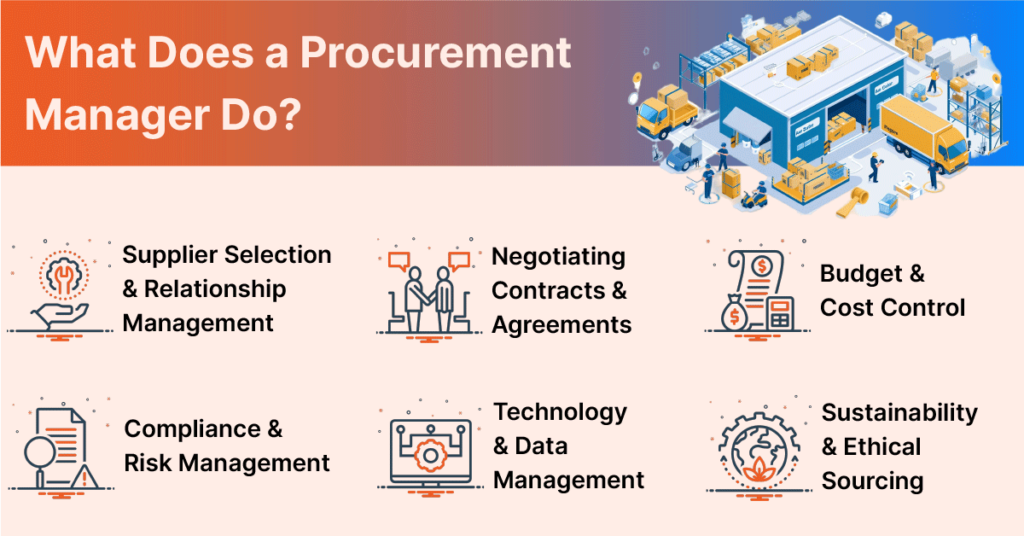
The importance of effective procurement cannot be overstated. In a global market where competition is fierce, organizations must ensure that they procure the correct goods and services at the right price and time.
Procurement is a fundamental business function that involves sourcing and acquiring goods and services essential for an organization’s operations. In the fast-paced world of business travel, the role of a procurement manager is crucial to maintaining efficiency, cost-effectiveness, and compliance.
It is pivotal in ensuring a company has the resources to produce its products, deliver services, and meet customer demands. As business travel companies strive to optimize their supply chains and reduce costs, the role of a procurement manager has become vital and more relevant than ever.
The procurement manager is crucial in achieving these objectives, ensuring that the right goods and services are procured at the right time and price.
But what is procurement management? What is a procurement manager? And what are their roles and responsibilities? This blog will help you understand everything you need to know about them.
What is Procurement Management in Business Travel?
Procurement management is the process of planning and getting the goods and services an organization needs. It includes key steps like identifying needs, choosing suppliers, negotiating contracts, and managing supplier relationships. The goal is to get quality products and services at the best price within the required time.
Effective procurement management is not just about cost optimization and risk minimization. It’s also about contributing to the company’s success. Procurement management ensures that resources are used efficiently by aligning activities with the organization’s objectives. This alignment helps achieve the organization’s overall goals effectively, consistently meeting the company’s operational needs.
For employees, selecting the ideal flight or the most suitable accommodation is crucial for a comfortable and efficient business trip. A thorough analysis should also prioritize travel expenses, ensuring the business chooses the most cost-effective options.
Who is a Procurement Manager in Business Travel?
Procurement management in business travel is the strategic process of sourcing, acquiring, and managing the goods and services necessary for business travel needs. It involves various activities, including selecting travel suppliers, negotiating contracts, and ensuring that travel services meet the company’s budgetary and quality standards.
Procurement management aims to optimize the travel procurement process, reduce costs, and ensure compliance with corporate policies while enhancing the overall travel experience for employees.
A key aspect of understanding what is procurement management in business travel lies in recognizing its role in creating value for the organization. Procurement managers can secure the best deals on flights, hotels, and other travel-related services by carefully selecting vendors and negotiating favorable terms.
Additionally, procurement management ensures that all travel arrangements align with the company’s financial goals, contributing to the broader success of the organization.
When discussing what is a procurement manager, it’s important to note that they are the professionals responsible for overseeing this entire process. They play a critical role in managing relationships with travel suppliers, analyzing spending patterns, and continuously seeking ways to improve the efficiency and effectiveness of the company’s travel procurement strategy.
What Does a Procurement Manager Do?
To fully understand what is a procurement manager, exploring the day-to-day responsibilities and tasks associated with this role is essential. The following sections will break down the primary duties of a procurement manager.
1. Supplier Selection and Relationship Management
One of the core responsibilities of a procurement manager is selecting suppliers. This includes providing the goods and services needed by the organization. It also involves researching potential vendors. The manager should evaluate their offerings and ensure they meet the company’s quality standards, budget constraints, and delivery timelines.
2. Negotiating Contracts and Agreements
Another critical aspect of what does a procurement manager do is negotiating contracts with suppliers. This involves more than just haggling over prices. It requires a deep understanding of the market, the company’s needs, and the supplier’s capabilities.
The procurement manager must ensure the contracts are fair, comprehensive, and legally binding, protecting the company’s interests while fostering a collaborative relationship with the supplier.

3. Budget Management and Cost Control
Budget management is a critical component of procurement management. The procurement manager ensures the purchasing process stays within the allocated budget. This requires careful planning, monitoring of expenses, and making adjustments as needed to avoid overspending.
4. Compliance and Risk Management
To fully understand a procurement manager, you should know this important aspect: The procurement manager must know the legal requirements governing procurement. These include anti-corruption laws, labor standards, and environmental regulations. Failure to comply with these regulations can lead to legal penalties, reputational damage, and financial losses for the company.
5. Technology and Data Management
Technology plays a crucial role in procurement management. The procurement manager must be familiar with software and tools that simplify purchasing. Data management is another critical aspect of the procurement manager’s role. Analyzing data on suppliers, market trends, and costs helps the procurement manager make informed decisions. This helps drive efficiency and cost savings.
6. Sustainability and Ethical Sourcing
Sustainability is becoming an increasingly important aspect of what is a procurement manager. Companies are pressured to source goods and services responsibly and ethically. The procurement manager must ensure that suppliers adhere to sustainable practices. These include reducing carbon emissions, minimizing waste, and promoting fair labor practices.
Ethical sourcing involves ensuring that the products and services procured do not harm people, animals, or the environment. This may involve auditing suppliers, setting ethical standards, and working with suppliers to improve their practices.
The Qualities of a Successful Procurement Manager
Now that we know what does procurement manager do, let’s explore the skills and qualities needed for success in this role. Here are some of the key attributes that make an effective procurement manager:
1. Analytical Skills
Procurement managers must be able to analyze complex data. For example, they must be able to analyze market trends, supplier performance metrics, and cost structures. Analytical solid skills enable them to make informed decisions. This in turn, optimizes the procurement process and drives cost savings.
2. Negotiation Skills
As mentioned earlier, negotiation is crucial to the procurement manager’s role. Effective negotiation requires the ability to secure favorable terms and the skill to build positive relationships with suppliers. A successful procurement manager must be persuasive, tactful, and able to find win-win solutions.
3. Attention to Detail
Managing contracts, budgets, and compliance requires meticulous attention to detail. A small oversight in a contract or a budget calculation can lead to significant problems down the line. The procurement manager must be thorough and precise in all aspects of their work.
4. Communication Skills
Strong communication skills are essential for collaborating with suppliers, internal stakeholders, and other departments. The procurement manager must be able to convey information, listen to feedback, and build consensus among different parties.
5. Problem-Solving Ability
Procurement often involves challenges, such as supply chain disruptions, quality issues, or cost overruns. A successful procurement manager must be a skilled problem solver, able to identify the root cause of issues and develop effective solutions.
6. Ethical Judgment
As sustainability and ethical sourcing become more critical, procurement managers must possess ethical solid judgment. They must be able to make decisions that align with the company’s values and prioritize the well-being of people, animals, and the environment.
7. Adaptability
What is a procurement manager if they can’t adapt to the constantly changing business landscape? Procurement managers must be able to adapt to new challenges and opportunities. Whether embracing new technology, responding to market shifts, or navigating regulatory changes, the procurement manager must be flexible and forward-thinking.
Challenges Faced by Procurement Managers
While the role of a procurement manager is rewarding, it also comes with its share of challenges. Here are some of the common challenges faced by procurement managers:
- Supply Chain Disruptions : Global events, such as natural disasters, political instability, or pandemics, can disrupt the supply chain and create significant challenges for procurement managers.
- Cost Pressures : Companies are always looking to reduce costs, and procurement managers are often under pressure to find ways to save money. Various factors can affect supplier reliability, such as financial instability, labor issues, or logistical challenges.
- Regulatory Compliance : Maintaining ever-changing regulations and ensuring compliance is a significant challenge for procurement managers. Failure to comply with laws and regulations can lead to legal penalties, financial losses, and reputational damage.
- Technology Integration : Procurement managers must keep up with new tools and systems that can streamline the procurement process. Integrating these technologies into existing workflows can be challenging.
Let itilite Help You With Procurement Management
The role of a procurement manager is integral to the success of any organization. They bridge the gap between the company’s needs and the market’s offerings. Knowing what is procurement manager highlights the critical importance of this role in driving organizational success.
itilite is a modern travel management company that helps companies make business travel seamless. If you are a procurement manager struggling with supplier and vendo negotiations, dont worry! We’ve got your back. At itilite, we negotiate on your behalf. Not only that, but we also help with budget management, ensure 100% compliance, and follow risk management methods.
To know more about itilite, book a free demo now!














